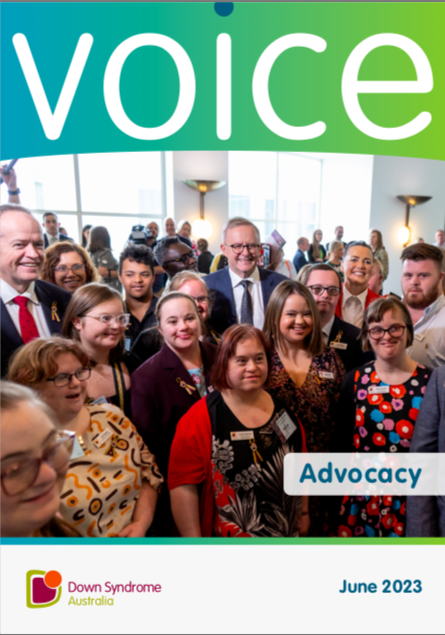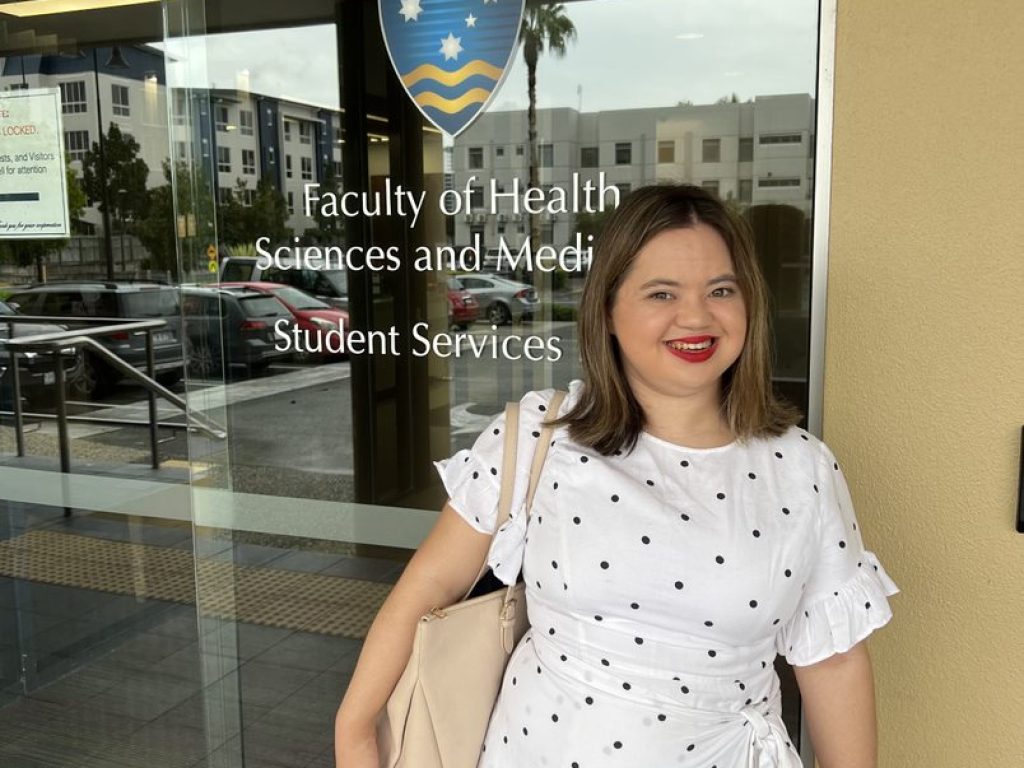Opening Doors and Improving Health Outcomes
By Jenny Crosbie, Swinburne University Researcher
A behind-the-scenes look at how Down Syndrome Australia’s (DSA) Health Ambassador Program is opening doors, starting conversations and making a real difference towards inclusive communication in health professions.
To read the full digital issue of Voice, download a copy here.
An independent evaluation conducted by The Centre for Social Impact at Swinburne University is finding that DSA’s Health Ambassadors program is changing health professionals’ understanding about communicating with people with Down syndrome, while building meaningful work opportunities for people with Down syndrome themselves.
The Inclusive Communication program aims to educate health care workers and health students about Down syndrome, intellectual disability, and inclusive communication. It has a novel design in that it utilises a team of people with Down syndrome, known as ‘Health Ambassadors’, who are employed by DSA as trainers and advisors to build the capacity of the health sector workforce.
Health Ambassadors deliver training to tertiary students studying in diverse health fields and health professionals already employed in the health sector right across Australia. As well as delivering training presentations about inclusive communication in health contexts, Health Ambassadors also promote inclusive communication messages to a wider audience, including policy makers, and advise on the design of resources and other issues relevant to the disability sector.
The evaluation found that being employed as a Health Ambassador contributed to four main outcome areas:
Personal development
Health Ambassadors reported feeling more confident and they saw the role as opening up new opportunities. Health Ambassadors had learned a range of new skills, including travelling for work, using technology and public speaking. Their family members noted increased independence and confidence, self- esteem and readiness for the future.
Sense of purpose
The Health Ambassadors felt that the work they were doing was important because it helped others with Down syndrome. The role itself was highly valued due to the opportunities made available. For example, meeting politicians at Parliament House in Canberra and presenting to auditoriums full of people, meant that the Health Ambassadors were immensely proud of the work they were doing and saw it as important in changing people’s lives.
Having employment and financial reward
Health Ambassadors were paid a full wage for their work and enjoyed other benefits associated with paid employment. The payment of real wages added to the sense of importance of the role. The role was also flexible enough to enable Health Ambassadors to take on other roles and to balance other commitments.
A sense of collegiality and finding a ‘tribe’
Health Ambassadors worked as part of a team, meeting regularly face to face and online. They were supported by a Health Program Manager during meetings and when giving presentations. The team structure enabled Health Ambassadors to feel supported by a group of colleagues with similar goals and to make new friends.
In the second half of 2022, over 1700 health professionals received training through the Health Ambassador program. Nearly one third completed a feedback survey after receiving training, with the evaluation finding that health professionals benefited from the program in several key areas:
Health professionals found the information about disability of most interest (199 identified this theme), with people commenting on prevalence of Down syndrome, learnings about continued prejudice and barriers, poorer health outcomes, and the importance of a human rights lens including affirming the capabilities of people with Down syndrome. A similarly large number (191) found learning about better provision of health care of most interest, particularly noting the gaps in current healthcare education about people with intellectual disability and diagnostic over-shadowing. Many valued learning directly from people with Down syndrome and hearing about their experiences in the healthcare system.
Overall, audience members expressed newly awakened awareness of strategies to mitigate exclusion for this group, particularly in relation to communication. In addition, a high number of health professionals stated they would use more inclusive and adaptive communication strategies when treating people with Down syndrome and would apply inclusive communication in their healthcare practice, as well as addressing accessibility issues and using person- centred care principles.
Overall, the critical elements of the model include its specific focus on health settings, the employment of people with lived experience in real jobs to deliver the training, and the program manager’s own experience both in health settings and supporting people with Down syndrome.
All these things contributed to the success of the program. It is hoped that the positive results of the evaluation will result in the continuation and expansion of the Health Ambassador program into the future.

Download the full digital edition of Voice here.


0 Comments